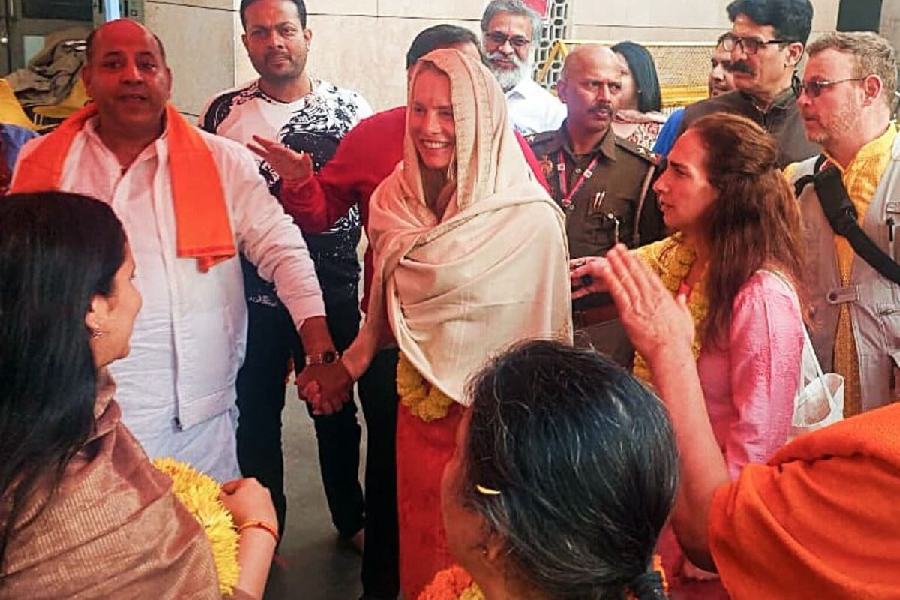Just like the times he had fought with China and Pakistan half a century ago, Amarjeet Singh is again standing at his post, determined never to abandon it.
Except that the retired army subedar and veteran of the 1962, 1965 and 1971 wars is 85 years old now. And if he’s facing no bullets this time, sleeping in a tractor-trolley in the biting winter is doing the old bones no good.
But the winner of four army medals, who left his village in Punjab’s Gurdaspur district on December 14, says he will not return home until the government repeals the three new farm laws.
“If the laws are not repealed, it will finish the farmers and farming. What will you eat in Delhi?” Amarjeet, who retired from the army in 1974, told The Telegraph on Saturday.
His village of Nainokot, which has 1,200 votes, had sent 15 people to fight the “just cause”. Apart from Amarjeet, the rest would go back on December 28, the old soldier said.
But another batch of 15 would arrive to pick up the baton, helping sustain the movement and their village’s honour.
If resolve such as Amarjeet’s is the fuel that ignited the month-old protest by a diverse group of farmers, their tactic of relay participation is the oxygen that is keeping the flame burning.
Kulwant Singh, sarpanch of the Balyali gram panchayat in Mohali district of Punjab and a member of the Bharatiya Kisan Union (Sidhupur), explained the pass-the-baton system.
About 1,000 people from seven Mohali villages — Karala, Jangpura, Barri, Shyaau, Matran, Shekhar Mazra and Khanpur Bangar — are at the protest site, he said. They came in tractor-trolleys loaded with food, mattresses, blankets, medicines and clothes.
“Every week, a new group of volunteers will arrive with food and other materials. Those among the earlier arrivals who want to return home will do so,” Kulwant said.
“This rotational participation is unique for a protest and can help sustain it for months.”
Some have come alone, like Balveer Kaur of Ghagha village near Patiala whose family owns four acres of farmland. When she found her husband dilly-dallying about joining the protest, the 64-year-old packed her bag and came over by bus to stand with her “brothers”.
“I told my husband, who has four acres of farmland, to come but he was delaying matters. So I decided to come by myself,” she said. “I didn’t want to miss the opportunity to be part of this historic protest.”
Women make up about 10 per cent of the estimated 10,000 to 15,000 protesters at the Singhu border between Punjab and Haryana, an agitator said. Protesters are also massed at Delhi’s Tikri and Ghazipur borders with Haryana and Uttar Pradesh, respectively, and at Shahjahanpur on the Haryana-Rajasthan border, 118km from Delhi.
Most of the farmers are from Punjab and Haryana. They present a motley group.
There’s MA (economics) student Satnam Singh from Karnal in Haryana and Mumbai-based businessman Gurjan Singh, who have arrived in solidarity.
Then there’s marginal farmer Sukhjeet Singh from Chamkor Sahib village in Ropar, Punjab, and “medium-size” farmer Gurupratap Singh from Barri village in Mohali.
Bills of fear
Lakhminder Singh, who grows paddy, wheat and potato on his eight acres at Karala village in Mohali and supports a family of 10, explained his fears.
The Farmers’ Produce Trade and Commerce (Promotion and Facilitation) Act allows farmers to sell their produce outside the government mandis (wholesale markets), run by the Agricultural Produce Market Committees, where they are assured a government-decided minimum support price (MSP).
The Farmers (Empowerment and Protection) Agreement on Price Assurance and Farm Services Act creates avenues for contract farming, and the Essential Commodities (Amendment) Act removes the limit on the stockpiling of several commodities.
“The government says the private mandis are for the benefit of the farmers. I have seen what happened to government schools and government hospitals after the expansion of private schools and private hospitals,” he said.
“Are you sending your children to government schools? The way the government schools deteriorated after the expansion of private schools, the same thing will happen to the government mandis.”
Once government procurement of farm produce stops, the private mandis will no longer pay the MSP, Lakhminder believes.
“When the MSP is not paid, farming will be destroyed. Every category of famer will face the problem,” he said.
Punjab’s farmers tend to have larger landholdings than their peers elsewhere. While the average landholding in India is 1.08 hectares (2.67 acres) among farmers, according to the Agriculture Census 2015-16, the figure is 3.62 hectares (8.94 acres) in Punjab, second only to Nagaland’s 5.06 hectares (12.5 acres).
A farmer with an operational holding of less than one hectare is a marginal farmer while one who has between one and two hectares is a small farmer.
Bill of fare
In the cold nights, the farmers sleep under makeshift polythene roofs in the thousands of tractor trolleys parked on both sides of the highway, where the protest stretches for kilometres towards Karnal on the Haryana side.
They spend the days chanting slogans or playing loud Punjabi songs from their tractors, which they drive up and down the protest venue so everybody feels entertained.
For those with somewhat different musical tastes, a rough-and-ready wooden stage has been erected at one end — right beside the barricades on the Delhi border.
Here, troupe after troupe from Punjab belts out kirtans all day long as hundreds sit enthralled on the patch of ground around the dais.
Like the food in the langars (community kitchens) and the RO water they supply, the music is free.
Not everyone sleeps in tractors. Some of the richer farmers come in SUVs like Cretas, Innovas and Fortuners. They stay on for two or three days, spending the nights in the climbers’ sleeping bags handed out from a big tent that has a board saying “Tent City”.
In between the tractors have mushroomed hundreds of temporary langars, even medical camps and a blood-donation camp.
Some of the langars are within 20 metres of each other, run by either a farmers’ group or a gurdwara. They serve whoever comes.
Around 11.30am on Saturday, a group of women were busy making rotis at a langar run by a farmers’ body. The sabzi, rice and sweets had already been prepared. A queue of about 20 people waited to be served.
A short distance away, on the opposite side of the road, a langar run by the Delhi Gurdwara Prabandhak Committee extended an open invitation to all. The chef, Balveer Singh, said the kitchen stayed open from 10am to 4am.
Satnam, the MA student from Panjab University, Chandigarh, said the Nirmal Kutia Gurdwara’s langar served quality food. The menu is missi roti, saag, puri and a dish of assorted vegetables for lunch. In the evening, the kitchen serves milk mixed with honey and ghee.
“My father’s a farmer. We have land at Rawal village in Karnal district. My family survives on farming. So I’ve come to help. When I go back, my cousin will come,” Satnam said.
Behind the kirtan stage is a blood donation camp organised by the Bhai Ghaniya Ji Mission Seva Society of Punjab. One of the organisers said that every day, about 200 people donated blood, which was sent to local hospitals.
The medical camps also do blood tests for various diseases, and the leftover blood in the syringes is used to write letters of protest to dignitaries such as the President and Prime Minister.
Gurjan, the young businessman from Mumbai, donated blood on Saturday.
“I have my business in Mumbai. We are originally from Patiala. I came here to support the protest,” he said.
Some among the young find time to play cards. Jaspreet Singh, a small farmer from Beherampur Zimmidari in Ropar district, said 35 people had come from his village.
“All my friends are sloganeering or helping out people. We have some time, so we are playing the card game Bhabhi,” he said.











